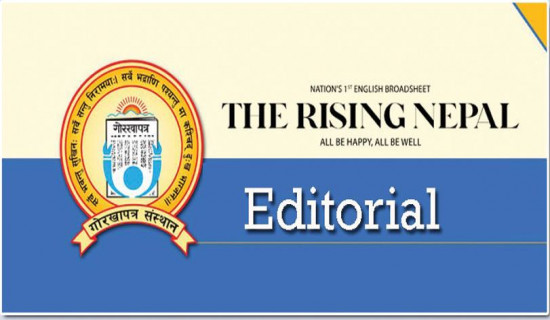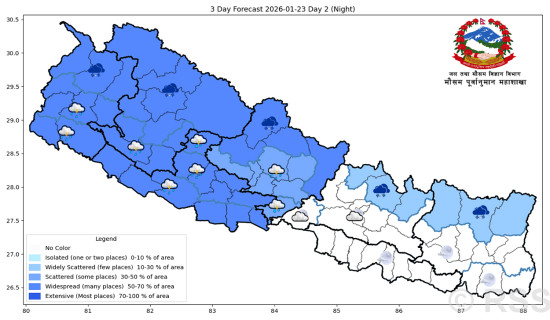- Thursday, 22 January 2026
Ensuring Equal Access
The 33rd International Day of Persons with Disabilities (IDPD) reminds us of the need to ensure equal rights for individuals with disabilities. The IDPD is a global call for governments, institutions, and societies to dismantle the barriers that perpetuate exclusion among the people with disablement. In developing nations like Nepal, where systematic challenges are rife, some initiative has been taken to improve the lives of the disabled individuals. But much more needs to be done. Despite commitments under international frameworks such as the Convention on the Rights of Persons with Disabilities (CRPD) and the Sustainable Development Goals (SDGs), there has been little progress, and gaps remain glaring. Globally, over 1.3 billion people live with some form of disability, and many face discrimination, lack of access to services, and exclusion from education, employment and public life.
In Nepal, these issues are even more profound. While laws and policies exist to support persons with disabilities, they are often not executed properly. Many individuals, especially in rural areas, are left without access to basic services like health care, education, and supporting devices. One of the biggest barriers to inclusion is the lack of understanding and awareness of disabilities. Misconceptions and stigma still prevail, causing people to view disabilities as weakness and curse rather than a natural part of human diversity. This mindset leads to discrimination and isolation. Many children with disabilities often drop out of school because schools are not well equipped to meet their needs. Many public spaces, including schools, hospitals, and offices, are not disabled-friendly, making it difficult for them to participate in daily activities.
Studies show that children with disabilities in the country are less likely to attend school, and those who do often face unequal treatment. Teachers are not trained to provide an inclusive learning environment, and the curriculum is not designed to accommodate diverse learning needs. Without proper education, children with disabilities miss out on opportunities for personal growth and future employment. Another pressing issue is the lack of assistive technology and accessible and friendly infrastructure. The government has introduced policies like the National Standard on Assistive Technology Services, but these remain unused. Many people with disabilities cannot access basic tools like wheelchairs, mobility canes, hearing aids, or communication devices that could help them live and work more independently.
Despite these challenges, there is hope. The Convention on CRPD, to which Nepal is a signatory, provides a strong framework for inclusion. It emphasises that persons with disabilities have the same rights as everyone else, including the right to make decisions about their lives and access opportunities. The 2030 Agenda for Sustainable Development also commits to “leaving no one behind, including persons with disabilities. To turn these commitments into reality, action is needed. The government must prioritise implementing existing laws and policies. This includes providing assistive devices, making public spaces accessible, and training teachers for inclusive education.
In addition, awareness campaigns are also essential to debunk stigma and perception of disability. It is crucial to involve persons with disabilities in decision-making processes at all levels of the government. Their voices and experiences are important to designing policies that can truly address their demands and needs. By breaking down barriers and creating more opportunities, individuals with disabilities can live dignified lives and contribute to their communities.

















